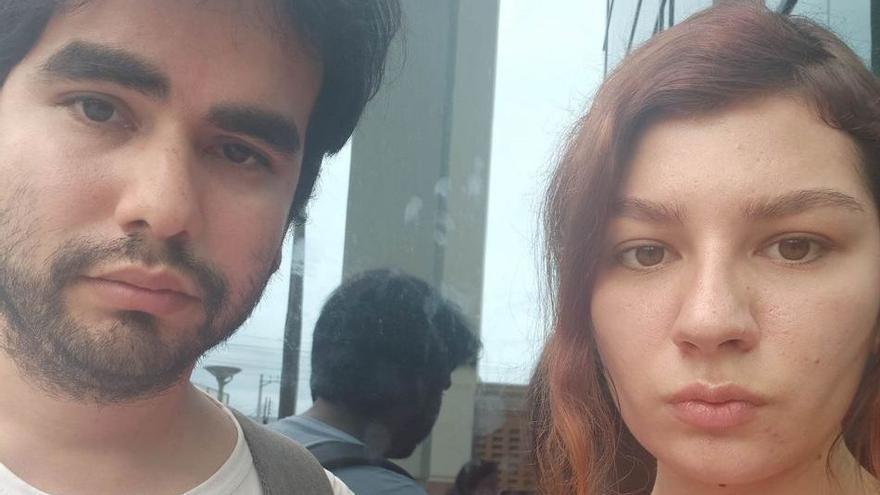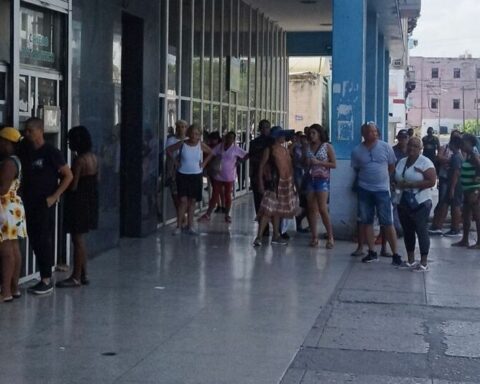Planted in front of the doors of the office of the UN Agency for Refugees (UNHCR) in Port of Spain, Trinidad and Tobago, waiting to be attended and be granted political asylumthe Cuban Carlos Jiménez and Daria, his wife of Russian nationality, sent this Wednesday a message to 14ymedio: “We are going out to fight for our human rights.”
In perpetual tension, both young men escaped from Saint Petersburg, where Carlos was about to be recruited by the Russian Army to fight against Ukraine, and then from Havana, where he had an official residence. The ideological contradictions with his family, affiliated with the regime, and the growing harassment by State Security, made the couple start moving again, this time towards Trinidad and Tobago, hoping to be recognized as refugees.
“Every day is a new battle for survival,” says Carlos, who had foreseen the difficulties they would suffer in exile, but not the seriousness of the situation in their host country. “Although the Government of Trinidad and Tobago signed the UN conventions on refugees, it did not ratify them, and that is why it does not comply with them,” he summarizes.
“Although the Government of Trinidad and Tobago signed the UN conventions on refugees, it did not ratify them, and therefore does not comply with them”
The worst possible scenario, he regrets, is deportation. “That would be fatal for us because they would separate us and send us to our countries where we would not be safe and they can arrest us,” she says.
In the event that Carlos is sent back to Havana, the political police will be able to retaliate against him, since, the young man recalls, before leaving the country he identified and exposed several agents of the regime: Juan Carlos Fonseca, of whom he affirms that he “deports some Cubans and denies entry to others,” and Edel Alfaro Jiménez, a well-known official to whom he put “a face.” It could all be made easier by a stronger attitude from the United Nations, but so far it has all been “just talk and no protection.”
To make matters worse, the couple was expelled from the place where they had been living until now, after suffering “a scam” by the owners. “We had to sleep with rats three nights in a row,” says Carlos. By denouncing the situation at the Living Water Community – “UNHCR’s right arm in Trinidad” – the officials seemed to suggest that the homeowners were right. Carlos faced them and reminded himself that as asylum seekers, they also had the right to be treated as human beings.
They managed to stay for two nights, but this Wednesday they had to find another place to stay, says the young man. “Today we still don’t know where we are going to sleep.”
Some Cuban exiles in Trinidad and Tobago have given them help and food. “They don’t have much, but what they have they share. They have made their life here after leaving the Island,” he describes.
In addition to the insistence in the UNHCR office, Carlos has launched a series of tweets drawing attention to his case and questioning the United Nations authorities. “They can and should help us, if all they say publicly is not empty words and they really care what happens to refugees,” he says, adding that his goal is to resent him and Daria in a country where They are not at risk of being deported.
“Cuba and Russia are very dangerous dictatorships and capable of anything. We are all in danger and these organizations must assume their responsibility towards us”
The options offered by Trinidad and Tobago are Canada, the United States and Australia, but these countries have not yet made a decision. His priority is the health of Daria, who has been especially affected by the stress of these days. “She can’t stand another night like those we spent on the street. This country has a very high crime rate,” she warns.
Carlos no longer maintains any contact with his family in Havana. Regime agents, he says, continue to attack them on social media. “I only know about Cuba what I read in the news and that already worries me enough. Vladimir Putin has already harmed his people and he is going to do the same with ours,” he explains.
He full speed approach of the Cuban government with the Kremlin reached its climax several days ago, when Miguel Díaz-Canel expressed the “unconditional support” of the regime in the “confrontation” of Russia against the West, while Putin’s envoy, Dmitri Chernishenko, suggested doing “some changes in the legislation of Cuba”, to better accommodate the “road map” of Moscow.
“We have already seen Putin destroy his own country little by little,” argues Carlos. “This is our personal opinion, but it seems to me that Raúl Castro and his puppet – Díaz-Canel – in order to obtain Putin’s support and remain in power they will give up anything, even the lives of Cubans. enriches a small group of oligarchs (the Cuban system is the same as the Russian system in that) and the price is paid by the people with blood, sweat and tears. Due to Cuba’s geographical position, this alliance is a danger worldwide. That is what I would like it to be understood at the level of international organizations. Cuba and Russia are very dangerous dictatorships and capable of anything. We are all in danger and those organizations must assume their responsibility towards us.”
For now, there is a silver lining: “Yesterday we had a meeting with a representative giving him more details about our case,” he says. “I hope they contact me again soon. What is needed is for the organizations to understand how urgent it is and that we depend on their reaction.”
At lunchtime, he wrote to this newspaper, discouraged: “All the UNHCR officials leave in their luxury cars and we are still here without having even eaten. The only decent people here are some security guards.”
________________________
Collaborate with our work:
The team of 14ymedio He is committed to doing serious journalism that reflects the reality of deep Cuba. Thank you for accompanying us on this long road. We invite you to continue supporting us, but this time becoming a member of our newspaper. Together we can continue transforming journalism in Cuba.







